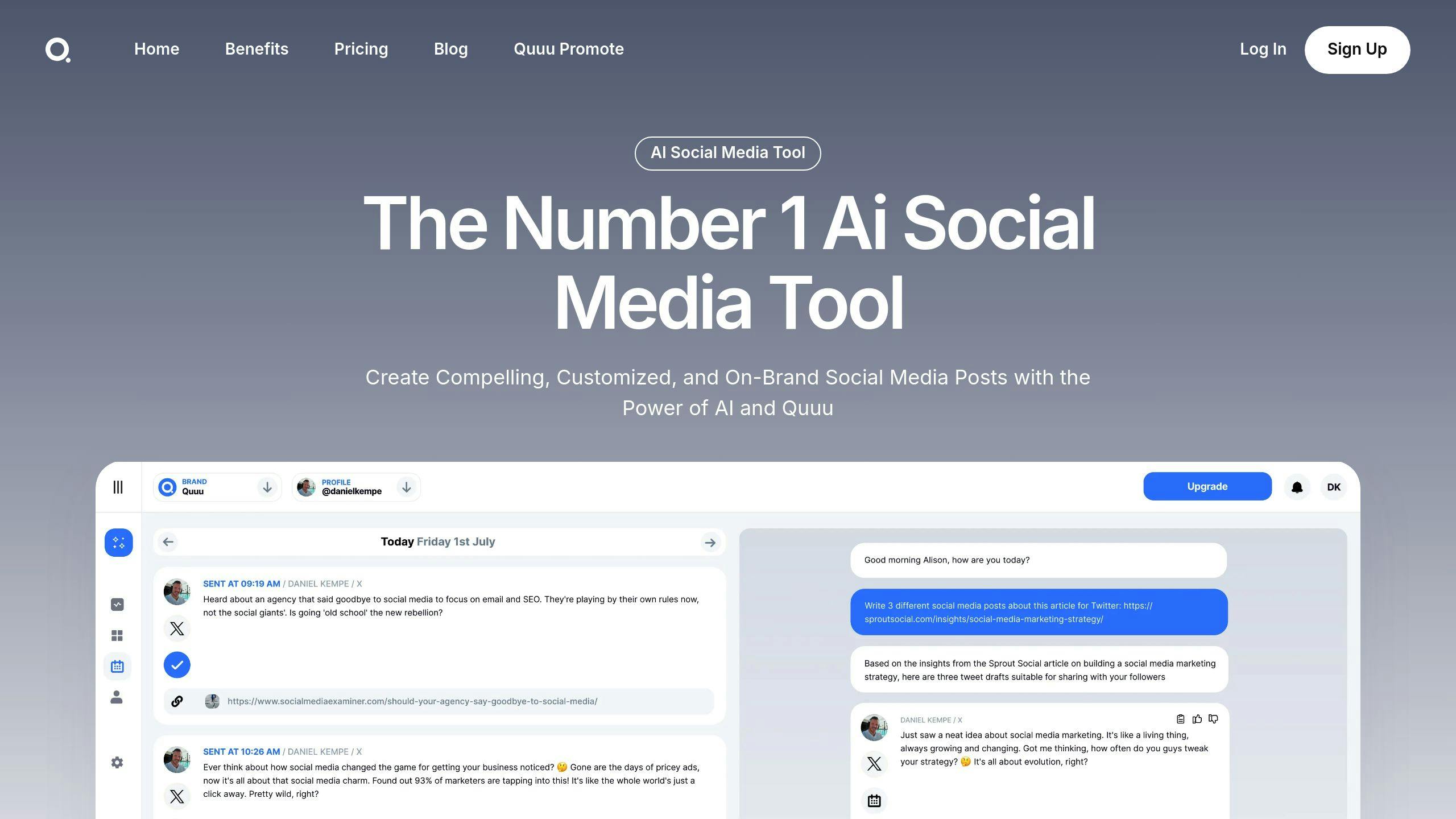Looking for top-notch content writing services? Here’s what you need to know:
- Assess your content needs
- Find reputable services
- Evaluate skills and experience
- Compare offerings and pricing
- Check quality control measures
- Consider collaboration processes
- Verify technical capabilities
- Ensure data security
- Test before committing
- Build a long-term partnership
Quick Comparison
| Factor | Why It Matters |
|---|---|
| Quality | Drives engagement and conversions |
| Communication | Ensures smooth collaboration |
| Tech skills | Boosts content performance |
| Pricing | Fits your budget |
| Industry knowledge | Creates relevant content |
| Turnaround time | Meets your deadlines |
Remember: The cheapest option isn’t always the best. Focus on value and results.
Pro tip: Start with a small project to test the waters before diving into a long-term deal.
Know What Content You Need
Before you hire a content writing service, you need to figure out what content your business actually needs. This step is crucial for picking the right service and getting your money’s worth.
Set Clear Content Goals
First, decide what you want your content to do for your business. Some common goals:
- Get more people to know about your brand
- Bring in more leads
- Boost sales
- Keep customers coming back
Make your goals specific. For example:
"Get 30% more website visitors in 3 months through our blog posts"
This clear goal gives you and your writers something to aim for.
Choose Content Types
Pick content types that’ll help you hit those goals. Some options:
- Blog posts
- Social media updates
- White papers
- Case studies
- Email newsletters
Each type does something different. Blog posts are great for SEO and building trust. White papers can help you get more leads.
Decide on Content Amount
Figure out how much content you need and how often. This depends on your goals, budget, and what you can handle.
Aim for consistency. For example:
- 1 blog post every week
- 3 social media posts each day
- 1 white paper every 3 months
Remember: Quality beats quantity. It’s better to post less often but make it good.
"If it’s not relevant, it’s just noise." – Jason Miller
This quote nails it. Create content that matters to your audience, not just to fill up space.
Find Good Content Writing Services
You know what content you need. Now, let’s find services to deliver it.
Where to Look
Start here:
- LinkedIn: Post a job or search for writers
- Upwork and Fiverr: Huge freelance platforms
- ProBlogger: Writing-focused job board
- Content agencies: Full-service options like Blogjoy
Checking Services
When reviewing providers:
- Niche experience: Do they know your industry?
- Portfolio: Quality and style check
- Engagement: For social content, look at likes and shares
- Skills: Can they edit, research, and handle SEO?
Short List
After initial checks, narrow it down:
| Service | Pros | Cons |
|---|---|---|
| Freelancer A | Knows industry, cheap | Limited time |
| Agency B | Full-service, consistent | Pricey |
| Platform C | Lots of talent, safe payments | Time to find the right fit |
Pick 3-5 top matches for deeper evaluation.
"Good freelancers deliver quality from the start. They can write different styles for B2B and B2C, producing well-researched posts." – Monika Adarsh, MobStac
Check Service Providers
When choosing a content writing service, focus on their skills and past work. This helps you find the right fit for your needs.
Look at Skills and Experience
Find writers who know your industry. They’ll create better content faster. Check if they can:
- Write various content types
- Research well
- Match your brand’s style
Review Past Work
Ask for samples. Look at:
- Writing quality
- Clarity of explanations
- Fit with your needs
Compare services:
| Service | Writing Quality | Industry Knowledge | Content Types |
|---|---|---|---|
| Service A | Clear, good grammar | Tech focus | Blogs, whitepapers |
| Service B | Engaging, some errors | General topics | Social media, articles |
| Service C | Professional, high-quality | Finance expertise | Reports, newsletters |
Read Client Feedback
Check what others say about:
- Meeting deadlines
- Following instructions
- Handling feedback
"We test writers on real projects. This helps us match clients with the right writers." – Sarah Johnson, Content Manager at WritePro
Compare What Services Offer
When picking a content writing service, focus on these key areas:
Types of Content Offered
Content services can whip up various types of content:
- Blog posts and articles
- Website copy
- Product descriptions
- Technical writing
- Social media posts
- Video scripts and podcast content
Make sure the service offers what you need. Siege Media, for example, zeroes in on SEO-driven blog content. ClearVoice, on the other hand, casts a wider net.
Industry Focus
Go for services that know your field. It’s a game-changer. Check this out:
- Crowd Content boasts over 6,000 writers across industries
- ClearVoice uses AI to pair you with writers who know their stuff in over 200 business niches
Prices and Packages
Pricing’s all over the map. Here’s a quick comparison:
| Service | Pricing Model | Starting Price |
|---|---|---|
| Media Shower | Monthly plans | $500/month |
| iWriter | Per word | $1.40 for 150 words |
| Writer Access | Membership + per word | $39/month + $0.02-$2/word |
| Godot | Per word/page | $1.30 per 100 words |
| BlogJoy | Flat monthly rate | £499/month |
Upwork? You set your own budget there.
Delivery Times
Need it fast? Here’s what some services offer:
- iWriter: As quick as one hour for short pieces
- BlogJoy: 1 new post every day!
- Godot: Four business days turnaround
But remember: faster isn’t always better. Quality matters.
To find your perfect match, list your needs and see how each service stacks up. It’s that simple.
Quality Control Steps
Picking a content writing service? You need to know how they handle quality control. Here’s what matters:
Editing and Proofreading
Good services use a multi-step editing process:
- Structural editing: Is the content organized well?
- Line editing: Are sentences clear and words well-chosen?
- Copy editing: Grammar, punctuation, and spelling fixes
- Proofreading: One last check for missed errors
Ivy B. Grey from WordRake has a tip:
"Reading aloud is more effective than reading silently to yourself because when you read silently, you tend to skip over errors, fill in words, or make unconscious corrections."
Try this when you get your content. It’ll help you spot issues.
Plagiarism Checks
Original content is a MUST. Ask services how they check for plagiarism. Many use tools like Copyscape or Turnitin.
Revision Rules
Clear revision policies protect everyone. Look for:
- Number of free revisions
- Time limit for requesting changes
- How to ask for revisions
| Ask About | Why It Matters |
|---|---|
| Free revisions | How many do you get? |
| Time limit | When’s the cutoff for changes? |
| Request process | How do you ask for edits? |
Quality control isn’t just error-catching. It’s making sure the content fits your brand and needs.
sbb-itb-43d9647
Working Together
Choosing a content writing service? Here’s what to look for in terms of collaboration:
How Easy to Reach
Good services offer multiple contact channels and quick responses. They’ll give you a dedicated point of contact.
"Your writer wants you to be treated as your partner, not your employee." – Marijana Kay, Content Writer
Project Management Tools
These keep everyone on track. Popular options:
| Tool | Key Features |
|---|---|
| Trello | Task boards, checklists |
| Asana | Control boards, task categories |
| ProofHub | Spell-checking, Google Drive integration |
| Narrato | Content calendar, drive-like structure |
Using Feedback
Quality services value your input. They’ll ask for detailed briefs and have a clear feedback process. To make feedback count:
- Use platforms like Google Docs for comments
- Give specific reasons for changes
- Highlight what’s working, not just what needs fixing
Technical Skills
When choosing a content writing service, tech skills matter. They’re crucial for creating content that shines online.
SEO Knowledge
Writers who get SEO are gold. They know how to make content that Google loves.
"You can’t write for the web without SEO skills." – ClearVoice
Top SEO writers:
- Research keywords
- Get search intent
- Use smart headings
- Aim for Google Snippets
Content Management Systems
Writers should be comfy with popular CMSs like WordPress. It helps them post and format content correctly.
| CMS | Market Share | Best For |
|---|---|---|
| WordPress | 62.7% | Blogs, business sites |
| Shopify | – | Online stores |
| Squarespace | – | Portfolios, small businesses |
Other Tool Integration
Make sure the service plays nice with your marketing tools. It’ll make everything run smoother.
Useful tools include:
These help writers create content that’s more likely to rank well.
Data Safety and Privacy
Protecting your business info is crucial when choosing a content writing service. Here’s what you need to know:
Confidentiality Agreements
Get an NDA. It’s not optional for sensitive projects. A solid NDA should:
- Name all parties
- Define confidential info
- Set duration
- State work ownership
Data Protection
Ask about data handling:
- Storage location
- Access control
- Security measures
ContentWriters uses "commercially reasonable" safeguards. But what does that mean? Dig deeper.
Content Ownership
Know who owns the content after creation. It’s not always clear-cut:
| Creator | Owner |
|---|---|
| Employee | Company |
| Freelancer (no agreement) | Freelancer |
| Freelancer ("work for hire") | Company |
"In a component-based, structured content ecosystem, there is no ‘yours’ and ‘theirs.’ There is only ‘ours.’" – Regina Lynn Preciado, Content Rules
To protect yourself:
1. Get a clear contract
2. Include an ownership clause
3. Specify portfolio usage rights
Make Your Final Choice
You’ve done your homework on content writing services. Now it’s decision time. Here’s how to pick the best fit:
Compare Good and Bad Points
Let’s break down the pros and cons of your top picks:
| Service | Pros | Cons |
|---|---|---|
| Media Shower | Professional journalists, scheduled delivery | Pricey ($500-$5000/month) |
| iWriter | Flexible pricing, accept/reject articles | Quality can be hit-or-miss |
| Content Fuel | Unlimited content, direct writer contact | Starts at $389/month |
Try Before You Buy
Don’t jump into a long-term deal right away. Test the waters first:
1. Pick your top 2-3 choices
2. Order a small project (like a 500-word blog post)
3. Check the quality, speed, and communication
A test article might cost you $50-$100 per service. It’s a small price to pay to avoid a big mistake.
Get It in Writing
Once you’ve picked a service, lock down the details:
- What you’re getting (content types, word counts, how often)
- When you’re getting it (deadlines for drafts and edits)
- How much you’re paying (rates and payment schedule)
- How many do-overs you get (most services offer 1-2 rounds of edits)
"A clear contract sets the foundation for a successful partnership. Don’t skip this step!" – Regina Lynn Preciado, Content Rules
Remember: Cheap doesn’t always mean good. A $300-$500 article might blow a $50 one out of the water.
Using AI for Content Help
AI is changing the content game. It’s making writing faster and better. Here’s how:
How AI Helps with Content
AI can:
- Pump out first drafts
- Come up with topics and keywords
- Spot grammar and spelling errors
Get this: AI can write 20 blog posts while you’re still working on one. That’s a lot of content, fast.
But AI isn’t perfect. It can mess up or write boring stuff. That’s why many companies use both AI and human writers.
Quuu: Your Social Media Sidekick

Quuu is an AI tool for social media. Here’s what it does:
| Feature | What It Does |
|---|---|
| Content Ideas | Gives you hand-picked stuff from 500+ topics |
| Auto-Posting | Posts for you on different social networks |
| Content Calendar | Helps you plan your social media strategy |
It costs $19.79 a month. Quuu finds and shares good content for you, saving you time.
AI and Humans: Better Together
The best content? It’s often a team effort between AI and humans. Here’s how it works:
1. AI writes a rough draft
2. Humans add their own flair
3. AI checks for mistakes
4. Humans give it a final look
This combo can lead to better content, faster. Take Forbes – they use AI for financial reports, but humans still polish them up.
Just remember: AI is a helper, not a replacement. Always give AI-generated content a once-over before hitting publish.
Build a Long-term Partnership
Choosing a content writing service is just the start. Now, it’s time to nurture that relationship. Here’s how:
Set Clear Goals
Tell your writers exactly what you want. Be specific:
- "We need 25% more website traffic in 6 months"
- "Let’s get 1,000 new email subscribers in 3 months"
- "Boost our social media engagement by 50% this year"
Clear goals = content that hits the mark.
Regular Check-ins
Stay in touch with your writing team:
| When | What |
|---|---|
| Weekly | Quick progress chat |
| Monthly | Deep dive into performance |
| Quarterly | Tweak the strategy |
Use these check-ins to spot wins and fix issues.
Plan for Growth
As you grow, you’ll need more content. Think ahead:
1. Ramp up volume
Start small, then increase. Maybe you begin with two blog posts a week, then bump it up to three or four.
2. Mix it up
Blogs are great, but don’t stop there. Add ebooks, whitepapers, or case studies to your content menu.
3. Spread your wings
Your website is home base. But consider guest posts or a stronger social media presence too.
Keep your writing service in the loop about these plans. They’ll help you scale smoothly.
Wrap-up
Picking the right content writing service? It’s not rocket science. But it’s crucial. Here’s what you need to focus on:
- Quality: You want writers who can nail your brand’s voice. No cookie-cutter content here.
- Communication: Quick responses and teamwork? That’s the dream.
- Tech-savvy: SEO know-how and CMS skills are a must.
| Factor | Why It’s a Big Deal |
|---|---|
| Quality | Gets people clicking and converting |
| Communication | Makes working together a breeze |
| Tech skills | Boosts your content’s performance |
Remember, your content needs will shift. So, keep your eyes on the prize:
- Set clear goals you can measure
- Check how your content’s doing every month
- Tweak your game plan based on what’s working
It’s all about staying flexible and keeping your content fresh. Don’t set it and forget it – keep refining your approach.






